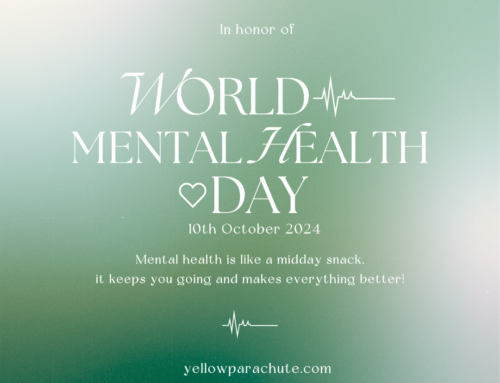That SAT score, that perfect college, that flawless photo of our dinner on Instagram: when did everything become so external to ourselves? It’s almost as though we aspire to be the data point of ourselves, rather than simply ourselves—those internal, intangible, unmeasurable, screenless selves. We at Yellow Parachute invest greatly in those metrics, but if we lose sight of that inner self, we might lose sight of something fundamental: our values. And if we aren’t sure what our values are—those qualities of goodness we most aspire to—we might lose sight of why we’ve devoted ourselves to those external pursuits in the first place.
This risk is why Rachel Moran often centers her clients’ values in her practice as a therapist. Rachel is a licensed marriage and family therapist at Choices Psychotherapy’s Chanhassen clinic, and she has been in the mental health field for over a decade. The foundation of her approach relies upon the insights of Family Systems Therapy—which considers the individual within the context of their family. In fact, Rachel explained that one of the common misconceptions about licensed marriage and family therapists is that they mainly see couples or families. “But 99% of my caseload is individuals,” Rachel said. “It’s really looking at people from a systemic perspective and that we are all born into relationships and the family…. So I can treat a family by working with one person.”
Using this systemic perspective as the “root,” Rachel frequently employs techniques based on what is called Acceptance and Commitment Therapy, or ACT. She finds this approach particularly effective with clients struggling with anxiety disorders, which can include chronic anxiety, panic disorders, OCD, PTSD, and social phobias. ACT isn’t a specific treatment model for anxiety but is meant to promote “psychological flexibility for anyone and everyone.” The theory revolves around six core principles, one of which concerns values.
Rachel works with her clients to identify their core values, which could be love, honesty, humor, reason, spirituality, stability, among others. Then, clients assess the degree to which their life is in line with those values and develop goals in response. For example, if belonging is a core value, but the client feels consistently isolated, their goal could be to reach out to a loved one during a difficult moment that week. This strategy can be powerful for a person struggling with anxiety, a feeling that tells us a particular action is more trouble than its worth. If the client can be mindful that belonging is essential to the wholeness of their life, they can know that reaching out really is worth it, even if their anxiety is telling them the opposite.
Although Rachel has found success with clients who struggle with anxiety disorders, the beauty of ACT is that it can apply to anyone. We all have moments where we find ourselves out of step with what we value. One common situation Rachel encounters is a family whose kid is so overscheduled that they don’t eat dinner as a family anymore. Perhaps that sacrifice is worth it, but perhaps it’s just how other families seem to work, and perhaps this structure prevents more love and connection in the family. Taking the time to explore your family’s core values can reveal which choices are worthwhile and which might be worth reconsidering.
Rachel recommended two simple exercises that any parent or child could do. 1) Print out and out this list of values—you can even make them into cards—and sort them into three piles: one for values that resonate with you, one for values that feel neutral, and one for values that don’t resonate at all. Whittle your list down to ten; these ten are your core values. How aligned are these values with your day-to-day life? 2) Imagine it’s your 80th birthday: what would you want people to say about you? Reverse engineer those things into values you can aspire to right now. How do you want to “show up” today to create that legacy when you’re 80?
Beyond these exercises, Rachel explained how it has always been her mission to “bring awareness to mental health in relationships, and destigmatizing getting help.” Then she shared the most moving experience she’d had in the past month: she learned that three of her clients had written their college essay about “the power that therapy has had, and how they were so glad they were able to get past the idea that therapy is for sick people.” Whether you’re a parent or a teenager, Rachel said, “You’re not meant to do this alone.”







